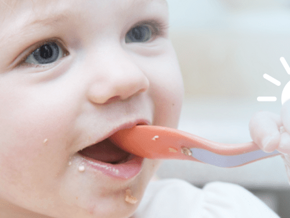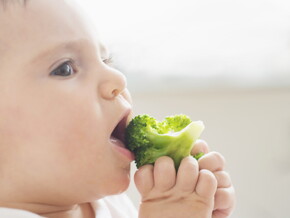
Sitting down as a family to share food is one of life’s simple pleasures. It’s a chance for your toddler to learn how mealtimes can be wonderful, shared experiences, full of conversation and laughter. And the benefits don’t end there. Family meals are a crucial part of helping your toddler learn to like a variety of nutritious foods. With the rest of the family as role models, your toddler will be encouraged to try, and enjoy, the same healthy, balanced meals you are eating. While having a toddler at the table can sometimes bring challenges, enjoying meals together helps families connect, and may also teach children healthy eating habits for a lifetime.
Sit at the table
As your child becomes more independent in their eating, this is a great time to continue the habit of eating together as a family as often as you can. Try to make mealtimes consistent and involve your child as much as possible—perhaps getting them to help “set” the table. This may translate as simply placing their own cup and cutlery on the table. Regularly taking part in preparing meals will help your toddler get used to the routine.
Your toddler is able to sit at the table with you for a limited amount of time. Make sure they are seated in a comfortable position and able to see the rest of the family. Avoid screens and other distractions.
While you’re offering your child nutritious foods in appropriate textures for their age, do your best to model healthy eating yourself. Show them how much you enjoy the same foods they are eating, and be enthusiastic about trying new flavours.
Gentle encouragement
If your child is reluctant to try new foods, keep offering them and encouraging them without pressuring them. A recent study looked at the way parents urge, or encourage, their toddlers to try a new food. The results suggest that words of encouragement, when used in moderation, may help when introducing new foods to toddlers. “On average, it takes about 2.5 encouragements before a child will try a new food, so a few attempts are definitely worthwhile,” says Lisa Fries, PhD, Behavioral Science Specialist at Nestlé Research in Switzerland. “Research has also shown that the children who ate the most vegetables had parents who used words of encouragement rather than rewards or undue pressure. Words of encouragement included why the child should taste the food, its health benefits (“will make you big and strong”), or comparisons to familiar foods (“it’s like a big raisin”).”
Effect on weight
Studies have shown that children who take part in family meals are less likely to be overweight. It can take planning, patience, and perseverance, with the rewards of their healthy growth worth the efforts. Practicing responsive feeding—creating a warm, positive environment for family meals, paying attention to your child’s hunger and fullness cues, and leading by example when it comes to varied and nutritious food choices—will also help them on the path to healthy independent eating.
Sources
Black RE, Makrides M, Ong KK (eds): Complementary Feeding: Building the Foundations for a Healthy Life. 2017 Nestlé Nutr Inst Workshop Ser, vol 87, pp 153–165, (DOI: 10.1159/000448965)
Dattilo AM Programming long-term health: Effect of parent feeding approaches on long-term diet and eating patterns. In: Early nutrition and long-term health, mechanisms, consequences and opportunities. Ed., Saavedra and Dattilo, Elsevier, 2017: 471-95.
Edelson L, Mokdad C, Martin N. Prompts to eat novel and familiar fruits and vegetables in families with 1-3 year-old children: Relationships with food acceptance and intake. Appetite 2016; 99:138-48.
Perez-Escamilla R, Segura-Perez S, Lott M, on behalf of the RWJF HER Expert Panel on Best Practices for Promoting Healthy Nutrition, Feeding Patterns, and Weight Status for Infants and Toddlers from Birth to 24 Months. Feeding Guidelines for Infants and Young Toddlers: A Responsive Parenting Approach. Durham, NC: Healthy Eating Research, 2017. Available at: http://healthyeatingresearch.org
Shloim N, Edelson LR, Martin N, et al. Parenting styles, feeding styles, feeding practices, and weight status in 4-12 year-old children: A systematic review of the literature. Front Psychol 2015; 6:1849. doi: 10.3389/fpsyg.2015.01849





















